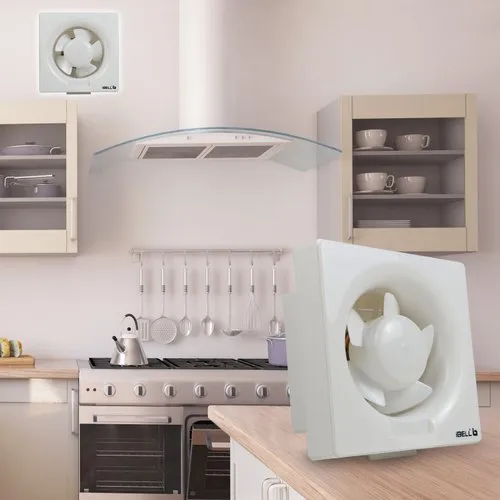Kitchen exhaust fans are an effective way to reduce airborne contaminants related to cooking in homes, but their effectiveness depends on fan characteristics, installation details and user behavior.
Studies have explored the effects of flow rate, fan type and whether or not leaving it on after cooking on integrated exposures 15 min after cooking. Results demonstrated that flow rate was the best predictor.
Cleanliness
An efficient kitchen exhaust fan is essential to creating a sanitary environment. Without regular cleaning, kitchen exhaust fans may become coated in thick grease deposits that clog their filters. Similar to how grease traps are cleaned, filters for your exhaust fan should also be immersed in a solution of approved grease-cutting cleaner and hot water until all grease residue has been loosed, followed by vigorous brushing with soft nylon brushes or using other approved methods to loosen it further. Finally, its cover or hood should also be taken down and washed with hot water and washing-up liquid to remove any buildup that might accumulates between cleaning sessions – similar to how grease traps.
Your exhaust fan should be professionally cleaned at least annually to ensure it’s operating effectively and efficiently, and to check for blockages in its ductwork that could lead to mildew or mold growth. As this task may require expertise and special tools, professional cleaning services such as heating & air conditioning companies or duct-cleaning services should usually handle it for you.
Heat Expulsion
Kitchen exhaust fans are an efficient way to clear away accumulated heat and smoke. Furthermore, they help get rid of unpleasant odors while significantly improving indoor air quality – this feature can be particularly important for people suffering from asthma or respiratory ailments.
An exhaust fan kitchen system typically consists of a hood, filters, ducts and an ozone generator. The hood sits above the stove and houses both fan and filter units while ducts transport smoke and odor outside your home while an ozone generator helps sanitize it before it exits through ducts.
One study conducted an experiment using twin research homes equipped with gas stoves and exhaust fans of various flow rates. Cooking procedures were repeated 60 times using six fan settings, and air pollutant concentrations were monitored continuously three hours post-cooking. Regression models revealed that decay rates and integrated exposures were affected by several predictor variables including fan flow rate, kitchen air exchange, and model of cooking.
Elimination of Bad Odors
Kitchen exhaust fans provide much-needed ventilation from stovetop heat sources, helping protect walls and ceilings from potential damage and eliminating unpleasant odors that could drive potential homebuyers away from your property.
Exhaust fans are often one of the first places in a room that accumulate dust, and this can become a source of foul odors. Bathroom exhaust fans may lead to mold and mildew growth while kitchen exhaust fans could become breeding grounds for bacteria as well as harbor soot and grease from cooking activities.
Cleaning an exhaust fan regularly will keep it looking its best and help remove unpleasant odors from your home or workplace. Before cleaning, first shut off power to the fan by unplugging or switching it off at the circuit breaker, and remove filters to soak in hot water solution mixed with some approved cleaner to loosen grease deposits before cleaning them with nylon brushes or scrub pads before installing back in place.
Energy Efficiency
Kitchen air can become polluted with smoke tar that clings to walls, furniture and appliances in the house. Therefore, having an exhaust fan to extract this smoke and prevent build-up is critical in prolonging their lives and helping other items in your house outlive them.
An exhaust system in your kitchen can also enhance ventilation in your house by drawing in fresh air from outside and helping keep it cleaner for everyone who resides within. Furthermore, it can reduce humidity levels which helps protect against mold and mildew growth.
Research has proven that kitchen exhaust fans can significantly decrease cooking emissions. Their effectiveness depends on their physical characteristics and flow rate; continuing to run one after cooking can reduce integrated exposures but less consistently than increasing its flow rate during preparation. Premium exhaust systems offer solutions which optimize fan rotation speed to only activate them when necessary – an especially welcome advantage.




